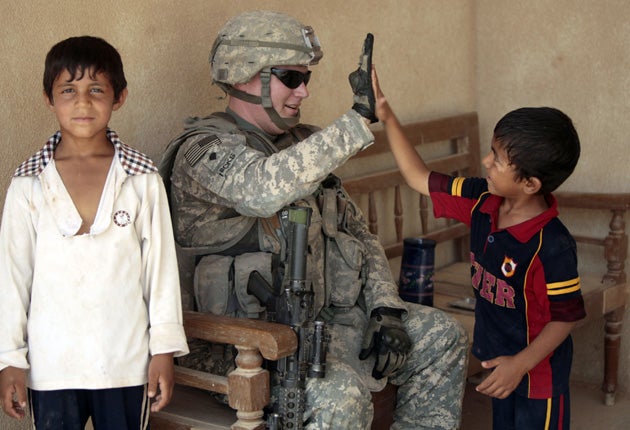Iraq: mission accomplished?
Five years after George Bush's premature declaration of victory, US troops are ready to leave Iraq. Patrick Cockburn reports

More than six years after US forces captured Baghdad, American combat troops will withdraw from all Iraqi cities and towns by tonight, handing over full control to the 600,000-strong Iraqi army and police and marking a crucial step in Iraq's return to independence.
Iraqi state television has been showing a clock with an Iraqi flag marking the time that remains until the US pull-out with the words: "June 30: National Sovereignty Day". The Prime Minister Nouri al-Maliki who, although closely allied to the US, nevertheless calls its departure a "great victory", has declared today a national holiday.
US troops have mostly already left the towns and cities where they were once the predominant military force. For months, it has been uncommon to see US patrols on the streets in Baghdad, though they have been more visible in Mosul in northern Iraq where there is more fighting.
The Pentagon is intent on avoiding any dramatic television pictures showing Americans in retreat which might stir memories of the fall of Saigon in 1975. It will keep 130,000 soldiers in bases outside urban areas until September and then steadily withdraw all combat troops from Iraq by August 2010 and remaining forces by the end of 2011.
The US is already seeing its power drain away as Iraqis take on board that American troops really are going. Mr Maliki is seeking to burnish his nationalist credentials by claiming it was he who forced the US to accept a timetable for the end of the occupation during lengthy and rancorous negotiations for a US-Iraq "status of forces agreement" signed by George Bush last year. President Barack Obama is sticking rigorously to this timetable.
A small number of US troops will remain behind but their presence will be low key and largely invisible. Convoys from Camp Victory, the US base at Baghdad airport, will travel to the Green Zone in central Baghdad only at night. In Mosul, US vehicles must have signs saying they are not part of a combat force. In rural areas, US combat operations can continue only with the permission of the Iraqi government.
Six years ago, Iraqis generally welcomed the overthrow of Saddam Hussein. But, unlike the US troop presence in Afghanistan, the US occupation was largely unpopular, according to opinion polls. Sectarian and ethnic divisions within Iraq were deepened by the occupation because each of the three big communities responded differently to it: Kurds supported it, Sunni Arabs fought against it and the Shia Arab majority co-operated with it in order to establish their rule. Having taken power, the Shia now want the Americans out, while many Sunni, defeated in the sectarian civil war between 2005 and 2007, are fearful of losing US protection.
The days immediately prior to the pullout saw a sharp increase in violence with some 250 Iraqis killed, mostly by vehicle-borne bombs targeting crowded Shia markets and worshippers leaving mosques. These atrocities have provoked doubts about whether or not the Iraqi security forces are capable of dealing with al-Qa'ida, the presumed perpetrators. Sadly, experience shows that neither Iraqi nor American security can stop bombs aimed at civilians.
Al-Qa'ida's aim in attacking the Shia is to provoke reprisals by the Shia-dominated security forces against the Sunni community, which might then become frightened enough to turn back to al-Qa'ida gunmen for defence. This could happen, but so far Iraqi government forces have not taken the bait.
Security is much improved in Baghdad and central Iraq compared to two years ago, when 3,000 people were being killed every month. But the improvement is only in contrast to the slaughter of the recent past. Baghdad may now be safer than Mogadishu, but it is still more dangerous than Kabul, The 2.2 million refugees who fled to Jordan and Syria are not returning in large numbers.
The refugees are not coming back because they are still dubious about security and living conditions. Electricity supply is better this year, but is still not permanent. There is a continuing lack of clean water. Iraq now has no fewer than 18 million mobile phones compared to none under Saddam, though the reliability and quality of the service has dropped alarmingly in the last year. Some two million people have jobs with the government and are well paid, but there is little other secure employment.
Iraqi society, infrastructure and economy were shattered by 30 years of war and sanctions. The US occupation failed to rebuild what was destroyed and, in many ways, exacerbated Iraq's problems. In the next few days, the oil ministry will begin awarding contracts to international oil companies, first to stop the fall in output from its giant fields, and then to raise production. Successful reconstruction will be the key to Iraq's long-term stability.
Countdown to withdrawal: The Iraq war in numbers
170,000 The number of US troops in Iraq at the peak of the invasion in 2003
135,000 The number of American service personnel in Iraq on 1 June 2009
4,303 The number of US military deaths
2,200 The number of Iraqi doctors and nurses killed during the conflict
92,438 The minimum number of documented deaths of Iraqi civilians
80,000 The number of mobile phones owned by Iraqis before the war, compared with the estimated 17.7 million handsets owned by the population now
500,000 The number of Iraqis who were living abroad before the invasion, compared with the estimated 2 million expats who are living overseas now
138 The number of journalists killed
2.41 million Current oil production at Iraq's oilfield, down from 2.58 million before the war
$674bn The estimated cost of the war in Iraq, equivalent to £407bn
Join our commenting forum
Join thought-provoking conversations, follow other Independent readers and see their replies
Comments
Bookmark popover
Removed from bookmarks